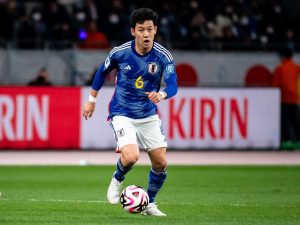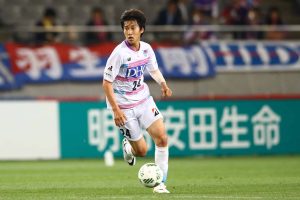
Ao Tanaka scored in the opening two minutes / photograph: Miki Sano
Winning by a whisker over lower-ranked North Korea. Why does Japan continue to struggle against Asian opposition?
It was a very disappointing victory.
The Japan national team played North Korea in the second round of Asian qualifiers for the 2026 FIFA World Cup on 21 March, winning 1-0. This was Japan’s third consecutive victory in their group, and they are on course to advance to the final qualifying round.
Ao Tanaka got Japan off to a great start by scoring inside the opening two minutes, but they then found themselves in control of the ball but unable to break down their opponents’ defence.
The game would have been much easier if Ritsu Doan had made sure with a decisive chance in the 43rd minute. However, he missed the opportunity and the second half was a game of endurance as the North Koreans stepped up the pressure. The home side were forced to play a defensive game, sending on Wataru Endo and changing to a back five, and in the end they only just managed to hold on for a point.
Even so, manager Hajime Moriyasu was positive after the match.
“We went into the game bearing in mind the problems we have had in the past, and were able to withstand difficult periods and counter-attack well. I think the players were able to fight a tough battle and gain confidence once more.”
Of course, in a qualifying round where victory is the only thing that counts three points are a commendable achievement. However, North Korea is ranked 114th, well below Japan, who are ranked 18th in the FIFA rankings.
Japan only just deserved to win the match, and there is a great amount of uncertainty heading into the remaining three matches in the second qualifying round* as well as the final round of qualifiers, which starts in September.
(*The away match against North Korea scheduled for 26 March has been postponed due to the impossibility of it being held in Pyongyang. A decision on that matter will be announced by FIFA at a later date, but North Korea may have to forfeit, giving Japan another three points.)
Japan struggles to deal with opponents who draw back into their own half and with long-ball attacks
At the Asian Cup in January, Japan were favourites to win the tournament but left the competition early after losing to Iran in the quarter-finals.
What emerged from that competition was Japan’s fragility in Asia, where they are so often unable to break down opponents who draw back into their own half, while at the same time struggling to deal with long-ball attacks. These same problems were highlighted again in the match against North Korea.
Having learnt from their mistakes at the Asian Cup, Japan had increased their awareness of the need to link up coming into the game against North Korea. In the first half, they were able to put this into action, but in the second half when they were pushed into a corner they often kicked the ball too long, which suited their opponents.
Tanaka, who was the link between defence and attack in midfield, commented: “In the second half, I felt there was room for improvement in our combinations. We kicked when we didn’t have to, and the distance between players was a bit too large. Of course, individual technical mistakes and errors in judgment aren’t something to worry about too much as they are things individuals can reflect on, but I think we can still take another step or two, speak up and help the ball holder find the right pass. We need to do more of that.”
High pressing and short counter-attacks were key elements of Japan’s 2023 campaign, which saw the national team win a series of victories against the likes of Germany and other powerhouses. However, this style alone won’t necessarily work against Asian sides that are more defence-minded and use long balls more often. Japan must be able to break down opponents who drop deep and have the ability to repel long balls. The current team has not developed these tactics.
For Japan, which has qualified for seven consecutive World Cups, progressing from the Asian qualifiers is a given. Moreover, from this year’s tournament, the Asian quota has increased from 4.5 to 8.5 teams. It is hard to believe that the Asian giants will miss out with the hurdle having been lowered, but there are no easy games, including in the final qualifying round.
Having lost to Iraq and Iran at the Asian Cup and struggled against North Korea this time, Japan may have a thorny road ahead of them.


